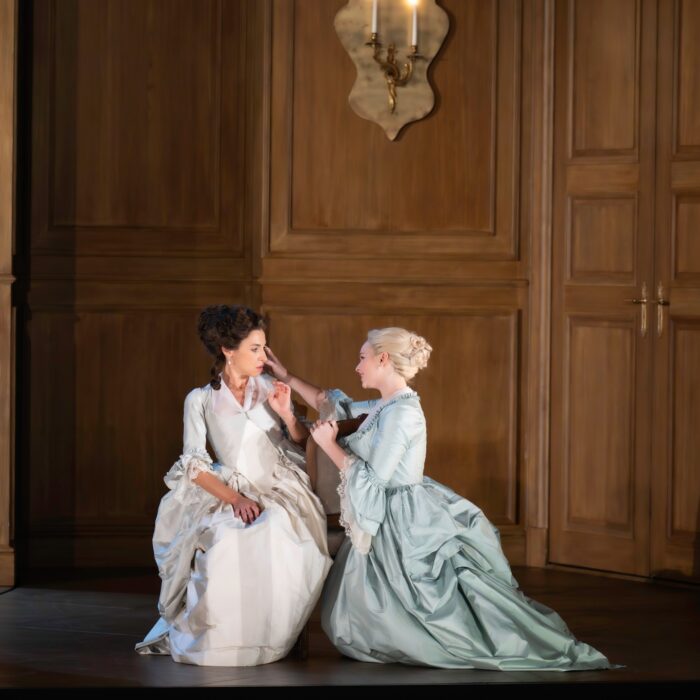
3 Christmas-Themed Operas From Around the World
By John VandevertPhoto Credit: Hindemith Foundation/Blonay, Switzerland
Christmas is a time of celebration for many people for many different reasons. Whether someone is religious or not, the Holiday season is a great time to connect with many of classical music’s absolute seasonal favorites like Tchaikovsky’s beloved ballet, ‘The Nutcracker,’ Menotti’s ‘Amahl and the Night Visitors,’ and Handel’s ‘Messiah.’
It is also, however, an equally great time to remember that, whilst Christmas-themed operas seem a niche topic, it has a generally historically significant place in the legacy opera as a whole. Beginning in the 18th century and proceeding to the 21st, Christmas-themed operas have been written and performed widely, From the concert halls of Imperial Russia to contemporary America’s many opera houses, Christmas operas are hardly a rarity. Some of the most popular operas about ‘Christmas’ have come from the last 20 years, Kevin Puts’ 2011 opera, ‘Silent Night‘. But outside generally well-known examples like Jake Heggie’s 2016 opera, ‘It’s A Wonderful Life,’ there exists a huge amount of unknown operas about Christmas themes that deserve to be recognized and remembered.
To celebrate the Christmas spirit, let’s look at three operas about Christmas themes from around the world. Unified by theme but distinct in the cultural ways Christmas is interpreted, these operas represent the many sides of the human experience which opera provides an outlet to express. Christmas operas like Spicer Carr’s new work, ‘Four Lost Santas,’ and revived productions of others like Rodion Shchedrin’s ‘A Christmas Tale,’ demonstrate the flexibility of opera to the whims of composers and in these examples, this couldn’t be more true!
Vakula the Smith (Russia)
Composed by Pytor Tchaikovsky during the summer to fall of 1874, the Ukrainian-based Christmas story follows the story, ‘Christmas Eve,’ written by Nikolai Gogol as included in his 1832 short-story collection, ‘Evenings on a Farm Near Dikanka.’ It was composed for a competition in 1874, sponsored by the ‘Russian Musical Society’ founded by Anton Rubinstein, but aesthetic conflicts stopped the opera from reaching its true potential. While the opera itself was not that popular, reworked by Tchaikovsky into the following opera, ‘The Slippers,’ composed in 1885 and premiering in Moscow in 1887 to a generally cool reception, it lives on as one of Tchaikovsky’s early experiments with the operatic artform before his more famous works like ‘Eugene Onegin,’ ‘The Queen of Spades,’ and ‘Iolanta.’
Les cadeaux de Noël (France)
Composed by Xavier Leroux, composer of the better-known French grand opera, ‘La reine Fiammette,’ with a libretto written by Émile Fabre, this opera found itself rendered topical given its heavy subject matter and advantageous premiere date of 1915, the beginning of WWI. Despite sharing a premiere with Jules Massenet’s ‘Werther’ and garnishing positive reviews, Leroux’s opera is not a household name when it comes to Christmas operas. The score of the work was published in 1915 and despite further performances in the years following its premiere, the work quickly fell from performance repertoire and has become a historical footnote.
Das lange Weihnachtsmahl (Germany)
The firebrand Paul Hindemith, not a stranger to controversy during and after his life thanks to his novel artistic style and vision, wrote the surprisingly non-controversial English-language opera, ‘The Long Christmas Dinner,’ based on the eponymous one-act play written by American playwright Thorton Wilder. Designed as a chamber opera, being formally recorded in 2015, the opera is not one of Hindemith’s most well-known operas, other more salacious and experimental alternatives like ‘Sancta Susanna’ and ‘Die Harmonie der Welt’ taking precedent. However, this opera proved to be a great step towards the ubiquitous phenomenon of chamber opera that we have today.
Listen
Categories
Special Features

